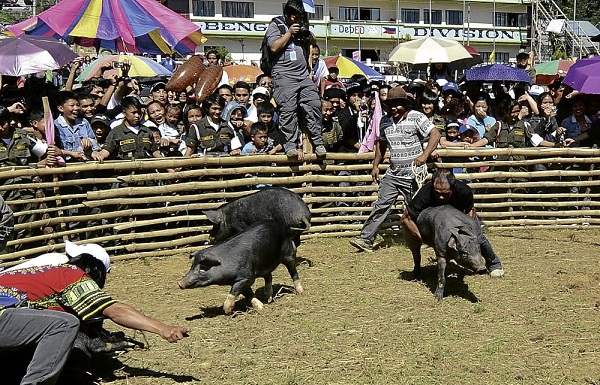Tax perks for Thai firm under fire

CONTESTANTS chase locally grown pigs, to be slaughtered for a feast, during Benguet Foundation Day last month. The province is among several in Luzon that have struggling backyard hog-raising industries that a hog raisers’ group said are now being threatened by a Thai company’s entry. EV ESPIRITU/INQUIRER NORTHERN LUZON
DAGUPAN CITY—The House committees on agriculture and on food security have asked the Bureau of Investments (BOI) to suspend the tax incentives granted to a Thai food giant, according to a swine industry leader.
Rosendo So, chair of the Abono party-list group and director of the Swine Development Council, said on Thursday that the House committees conducted a hearing on Tuesday to determine whether the government erred in granting a six-year tax holiday to the Thailand-based Charoen Pokphand (CP) Foods, a food conglomerate which has invested in a local poultry farm project.
The BOI granted CP Foods a pioneer investor status, which would allow it to enjoy six years of tax holidays for raising and manufacturing hog meat products, and from four to seven years in financial benefits for poultry products.
Pioneer status
The status also provides CP Foods the privilege of not paying tariff on imported feed ingredients, equipment and other materials needed for the operations of its hog and poultry farms.
Article continues after this advertisementSo attended the House committee meeting but the Thai firm did not send any representative.
Article continues after this advertisement“The committees found plenty of irregularities in granting [CP Foods a pioneer investor status that would allow it to build a poultry enterprise at the heart of Central Luzon’s meat trade],” he said.
He said among the irregularities are the apparent acquisition of over 100 hectares of property in various parts of Central Luzon, which CP Foods would use to develop its poultry project.
“Foreigners cannot own lands in the country, and CP Foods is a 100-percent foreign-owned company. How was it able to acquire pieces of land?” So said.
The Thai firm first started business in Cebu in 2007. It has since bought properties in Floridablanca and the City of San Fernando in Pampanga; Gerona, Tarlac; Jaen, Nueva Ecija, and Bataan, according to reports.
What lands?
So released a statement detailing the outcome of the committee meeting. It said Department of Agrarian Reform Director Nestor Floranda had testified he was unaware of lands being developed for the Thai firm because 80 percent of agricultural lands in Luzon have been converted into agrarian land and distributed to farmers.
So said the ambiguities in the regulation of CP Foods also imperiled local hog and poultry raisers.
“The Department of Trade and Industry did not specify that CP Foods was required to sell its meat products to the processing plants, so it could sell its products instead in the wet markets and would therefore compete with the local hog raisers,” So said.
“The playing field is clearly uneven and very disadvantageous to the local farmers, if [CP Food’s incentives] push through. We are not against CP Foods operating in the country but the company should not be given the perks and privileges that would kill the local industry,” he said.
He also questioned CP Food’s pioneer investor status because, he said, it is not introducing meat producing technology.
CP Foods is expected to invest between P4 billion and P7 billion and provide jobs to 1,800 workers. But So said it may displace up to seven million workers in the hog and poultry sectors.
In the group’s statement, several congressmen were quoted as saying they were demanding an investigation of the grant of a tax holiday and other incentives to the Thai firm. Yolanda Sotelo, Inquirer Northern Luzon